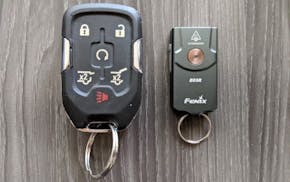Q: I have a 2004 Ford F-350 dualie diesel. One night at 2 a.m. I heard my radio blaring from inside my house. When I went outside there was no one near my truck. The key was in my pocket but the radio was playing and I could use all my electric window controls. Since then I've been taking out the fuse out every time I turn off my truck so the battery won't die. I replaced the ignition switch but it didn't help. Any ideas?
A: Recognizing that both the radio and power windows are controlled by the accessory delay system, which maintains power to these systems even after the ignition is turned off until you exit the vehicle, I'd check the C2075 accessory delay relay in the central junction box located behind the lower dash panel on the driver's side. I suspect this relay might be grounding or sticking, causing the accessory systems to come on. If so, it's an easy fix.
Q: I have a 2004 GMC Envoy with the 4.2-liter engine and 106K miles. It sounds like a diesel on start-up. My neighbor keeps asking what diesel is in it. I have run it with the serpentine belt removed and there is no change. I would describe it as a loud rattle with lifter noise. It sounds about the same from both sides and it gets only slightly better as it warms up. I have always changed the oil at 5K miles using conventional oil. Any thoughts?
A: By temporarily removing the serpentine belt, you've eliminated all the ancillary components as culprits. I would suggest purchasing an inexpensive automotive stethoscope to listen precisely to engine components that could be generating the rattle. With the engine running and making the noise, work your way down each side of the valve cover, listening carefully for a valve/cam issue from the dual overhead cams. Also, carefully listen at several points on the front timing cover as well as the front of the valve cover to determine if the noise originates from the timing gears/chain assembly.
Noise from the upper valve train — cam, rocker arms, valves, valve guides — could be from wear or could be from carbon buildup in the valve guides. Adding half a can of SeaFoam to the oil to help soften and remove these deposits may quiet the engine down. I've had some success by removing the valve cover on a warm engine and pouring SeaFoam directly onto the valves and guides and letting it sit overnight before starting.
If the noise is originating from the timing gears or chain, I'd be more concerned. A worn chain or guides or even worn oil pump components located behind the timing chain could mean bigger issues.
Q: I have a 2013 Ford Escape. It has front-wheel drive with the Intelligent 4 Wheel Drive System. Two tires got ruined so I had to purchase two new tires. The original P235/45R19 rear tires have 24,000 miles on them and are in good shape. Someone told me I should not replace just two tires with this type of drive system. Are they right or wrong? And will it hurt anything just replacing two tires?
A: If all four tires are not within a few percentage points of being the same diameter, potential damage can occur. A new P235/45R19 tire measures 27.33 inches in diameter. If your original rear tires are roughly 50 pecent worn at 24K miles, they will have roughly 6/32" of the original 11/32" of tread remaining. Subtracting 10/32" – 5/32" from each "end" of the diameter leaves a diameter of roughly 27.0175", a difference of just about 1%.
The system in your vehicle provides torque to the front wheels and sends torque to the rear wheels only when it senses slippage, which reduces the potential for driveline stress. It's your car and your call, but with that small a difference in tire diameters, I don't think you'd have a problem.



